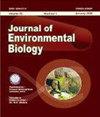面包小麦耐高温基因型生理性状与产量性状的相关性研究
IF 0.7
Q4 ENVIRONMENTAL SCIENCES
引用次数: 0
摘要
目的:研究热胁迫在面包小麦基因型生理性状和产量性状相关中的作用。方法:以7个小麦基因型(PBW781、RWP-2018-30、PBW821、RWP-2018-31、WH1239、RWP-2018-26和RWP-2018-32)和3个对照品种(DBW14、WH730和RAJ3765)为研究对象,在Hisar市CCS HAU小麦科大田研究区(2018-19)在适时播种(TS)和晚播(LS)条件下种植。为了产生热应激,从及时播种开始,晚播延迟4周。在两个条件下对这些小麦品系进行了几种生理和产量性状的评估,发现一个基因型在晚播条件下具有耐热性。结果:在播后条件下,PBW821籽粒产量最高,归一化植被指数、光合速率、叶绿素含量较高,冠层温度较其他品种低,属于耐热品种。解释:耐热小麦基因型的鉴定将为高温条件下高产小麦品种的培育提供宝贵资源,这些发现也可用于育种计划。关键词:籽粒产量;耐热性;生理性状本文章由计算机程序翻译,如有差异,请以英文原文为准。
Correlation between physiological and yield attributes in bread wheat genotypes for high temperature tolerance
Aim: The aim of the present study was to observe the role of heat stress in the correlation of physiological and yield attributes in bread wheat genotypes. Methodology: Seven wheat genotypes (PBW781, RWP-2018-30, PBW821, RWP-2018-31, WH1239, RWP-2018-26, and RWP-2018-32) along with three check varities namely DBW14, WH730, and RAJ3765 were grown under timely sown (TS) and late sown (LS) conditions in the field research area of Wheat Section, CCS HAU, Hisar (2018-19). For generating heat stress, delay in sowing (4 weeks) was done in late sown from timely sown. These wheat lines were assessed for several physiological and yield attributes under both conditions and one genotype was found to be heat-tolerant under late sown condition. Results: PBW821 was classified as thermo-tolerant due to maximum grain yield, higher normalized difference vegetation index, photosynthetic rate, chlorophyll content, and lower canopy temperature compared to other varieties under late sown conditions. Interpretation: Identification of a heat-resistant wheat genotype would be a valuable resource for developing high-yielding cultivars under high-temperature conditions, and these findings might also be used in breeding programs. Key words: Grain yield, Heat tolerance, Physiological traits, Triticum aestivum
求助全文
通过发布文献求助,成功后即可免费获取论文全文。
去求助
来源期刊

Journal of environmental biology
ENVIRONMENTAL SCIENCES-
CiteScore
1.70
自引率
0.00%
发文量
92
审稿时长
3 months
期刊介绍:
Information not localized
 求助内容:
求助内容: 应助结果提醒方式:
应助结果提醒方式:


